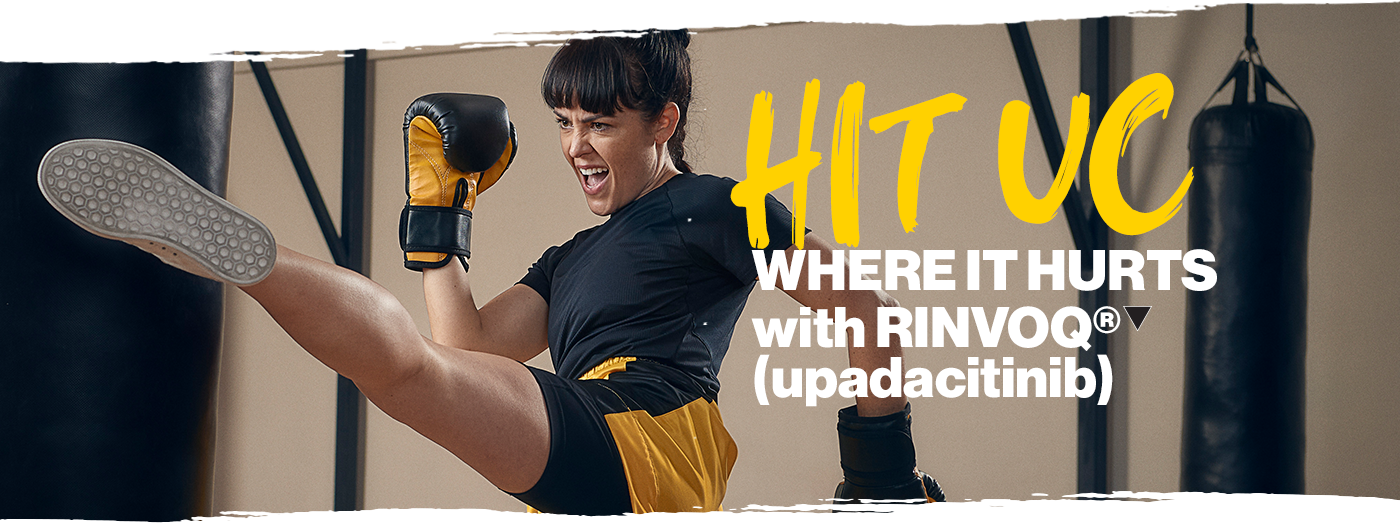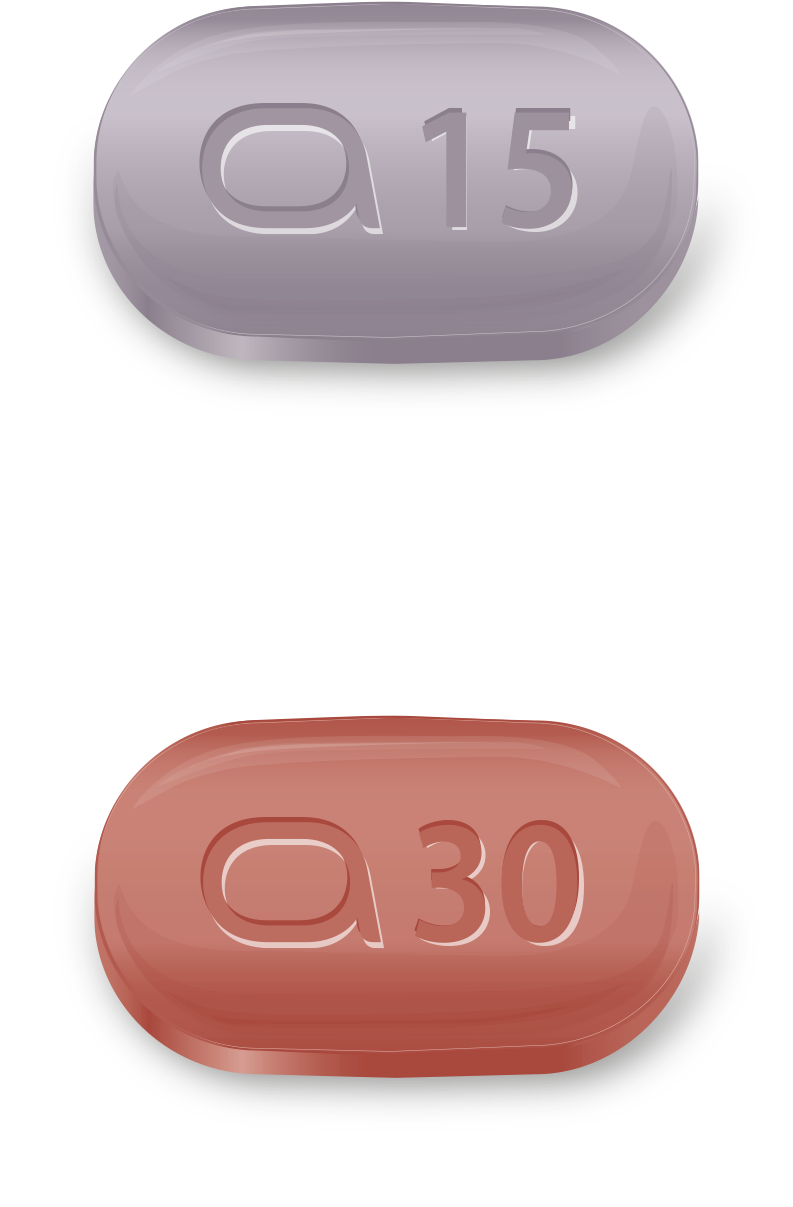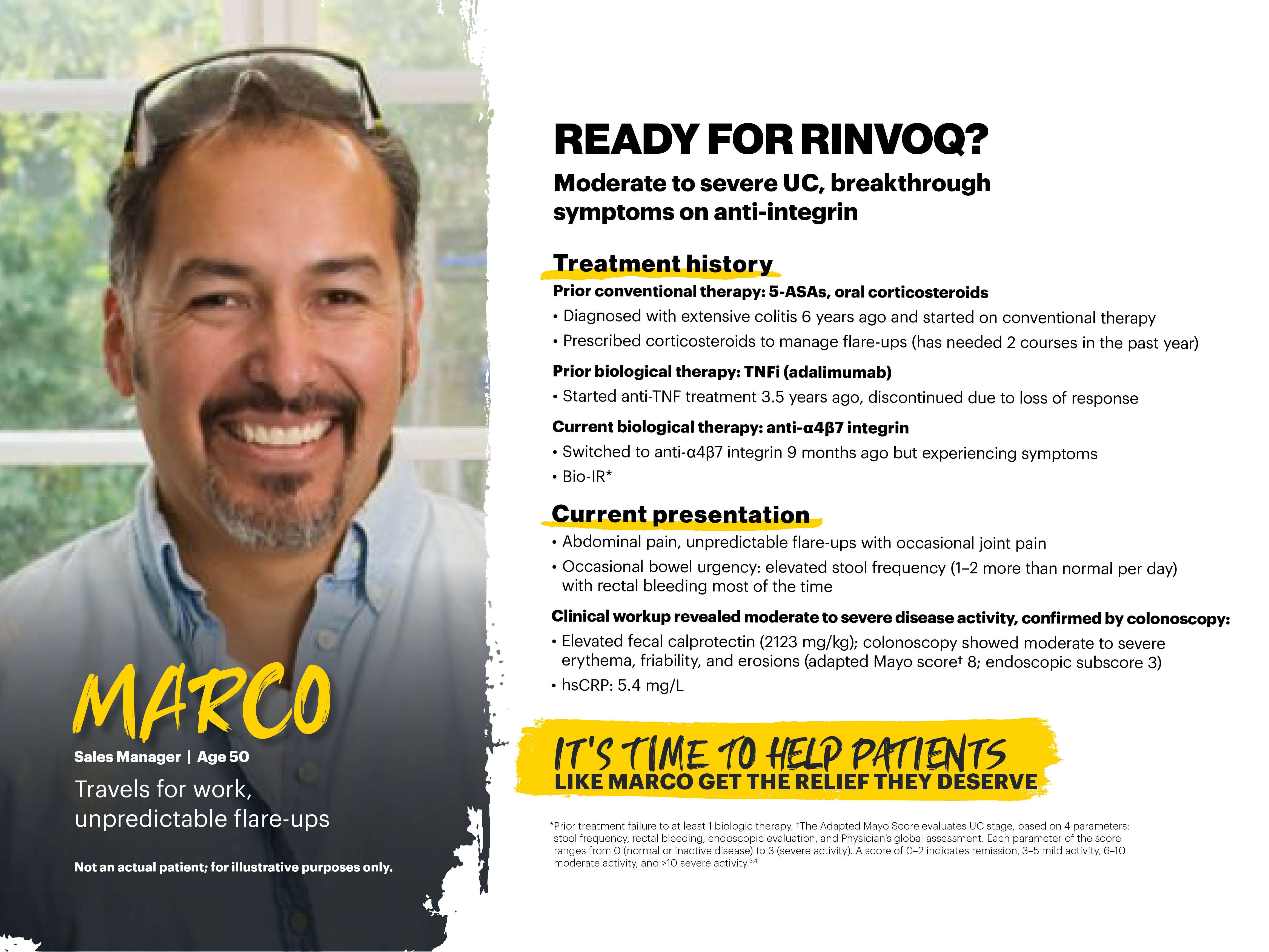RINVOQ® (upadacitinib) is indicated for the treatment of adult patients with moderately to severely active ulcerative colitis (UC) who have had an inadequate response, lost response or were intolerant to either conventional therapy or a biologic agent.1
RINVOQ achieved the primary endpoints of clinical remission per adapted Mayo score at Induction Week 8 and Maintenance Week 521,2
▼ This medicinal product is subject to additional monitoring. This will allow quick identification of new safety information. Healthcare professionals are asked to report any suspected adverse reactions.
Week 8-16: For patients who have not achieved adequate therapeutic benefit after the initial 8-week induction, prolonged induction for an additional 8 weeks with a dose of 45 mg QD may be considered
The recommended maintenance dose of RINVOQ is 15 mg or 30 mg QD based on individual patient presentation:
A dose of 30 mg QD may be appropriate for some patients, such as those with high disease burden requiring 16-week induction treatment who are not at higher risk of VTE, MACE, and malignancy, or who do not show adequate therapeutic benefit to 15 mg QD
For patients 65 years of age and older, the recommended dose is 15 mg QD.
In patients who have responded to treatment with RINVOQ, corticosteroids may be reduced and/or discontinued in accordance with standard care.
RINVOQ should only be used if no suitable treatment alternatives are available in patients:
Patients with history of atherosclerotic cardiovascular disease or other cardiovascular risk factors (such as current or past long-time smokers);
RINVOQ is to be taken orally once daily with or without food and may be taken at any time of the day. Tablets should be swallowed whole and should not be split, crushed, or chewed.1
Full RINVOQ dosing information in UC can be found in the SmPC.
Please consult the Summary of Product Characteristics for further details regarding contraindications, monitoring requirements, and additional prescribing information prior to initiating RINVOQ.
Meet 3 moderately to severely active UC patients* (Andrew, Meera, and Marco) and learn more about how RINVOQ treatment could be helpful to them.
*Hypothetical patient cases.
Not actual patients; for illustrative purposes only.
Consider the risks and benefits of treatment prior to initiating RINVOQ.1
5-ASA: 5-animosalicyclic acid; aMs: adapted Mayo score; bio-IR: biologic inadequate response; CYP3A4: cytochrome P3A4; ESS: endoscopic subscore; hsCRP: high-sensitivity C-reactive protein; IR: inadequate response; QD: once daily; RBS: rectal bleeding score; TNFi: tumor necrosis factor inhibitor; UC: ulcerative colitis.
Study designs: U-ACHIEVE Induction (UC-1) and U-ACCOMPLISH (UC-2) were replicate induction studies, both of which were multicenter, double-blind, placebo-controlled clinical studies. In UC-1 and UC-2, 988 patients (473 and 515 patients, respectively) were randomized to RINVOQ 45 mg QD or placebo for 8 weeks with a 2:1 treatment allocation ratio and included in the efficacy analysis. All enrolled patients had moderately to severely active UC defined as aMs of 5 to 9 with an ESS of 2 or 3 and demonstrated prior treatment failure including inadequate response, loss of response, or intolerance to prior conventional and/or biologic treatment. U-ACHIEVE Maintenance (UC-3) was a multicenter, double-blind, placebo-controlled clinical study with 451 patients who achieved clinical response per aMs (decrease ≥2 points and ≥30% from baseline and a decrease in RBS ≥1 from baseline or an absolute RBS ≤1) with 8-week RINVOQ 45 mg QD induction treatment. Patients were rerandomized 1:1:1 to receive either RINVOQ 15 mg QD, 30 mg QD, or placebo.1,2
UP NEXT
[Note to Affiliate: HCP-delivered patient materials and their inclusion herein are subject to local codes and regulations.]
[Please insert local summary of safety]
REFERENCES
- RINVOQ [Summary of Product Characteristics]. AbbVie Deutschland GmbH & Co. KG; December 2023.
- Danese S, Vermeire S, Zhou W, et al. Upadacitinib as induction and maintenance therapy for moderately to severely active ulcerative colitis: results from three phase 3, multicentre, double-blind, randomised trials. Lancet. 2022;399(10341):2113-2128. doi:10.1016/S0140-6736(22)00581-5
- Rutgeerts P, Sandborn WJ, Feagan BG, et al. Infliximab for induction and maintenance therapy for ulcerative colitis. N Engl J Med. 2005;353(23):2462-2476. doi:10.1056/NEJMoa050516
- Schroeder KW, Tremaine WJ, Ilstrup DM. Coated oral 5-aminosalicylic acid therapy for mildly to moderately active ulcerative colitis. A randomized study. N Engl J Med. 1987;317(26):1625-1629. doi:10.1056/NEJM198712243172603


















































